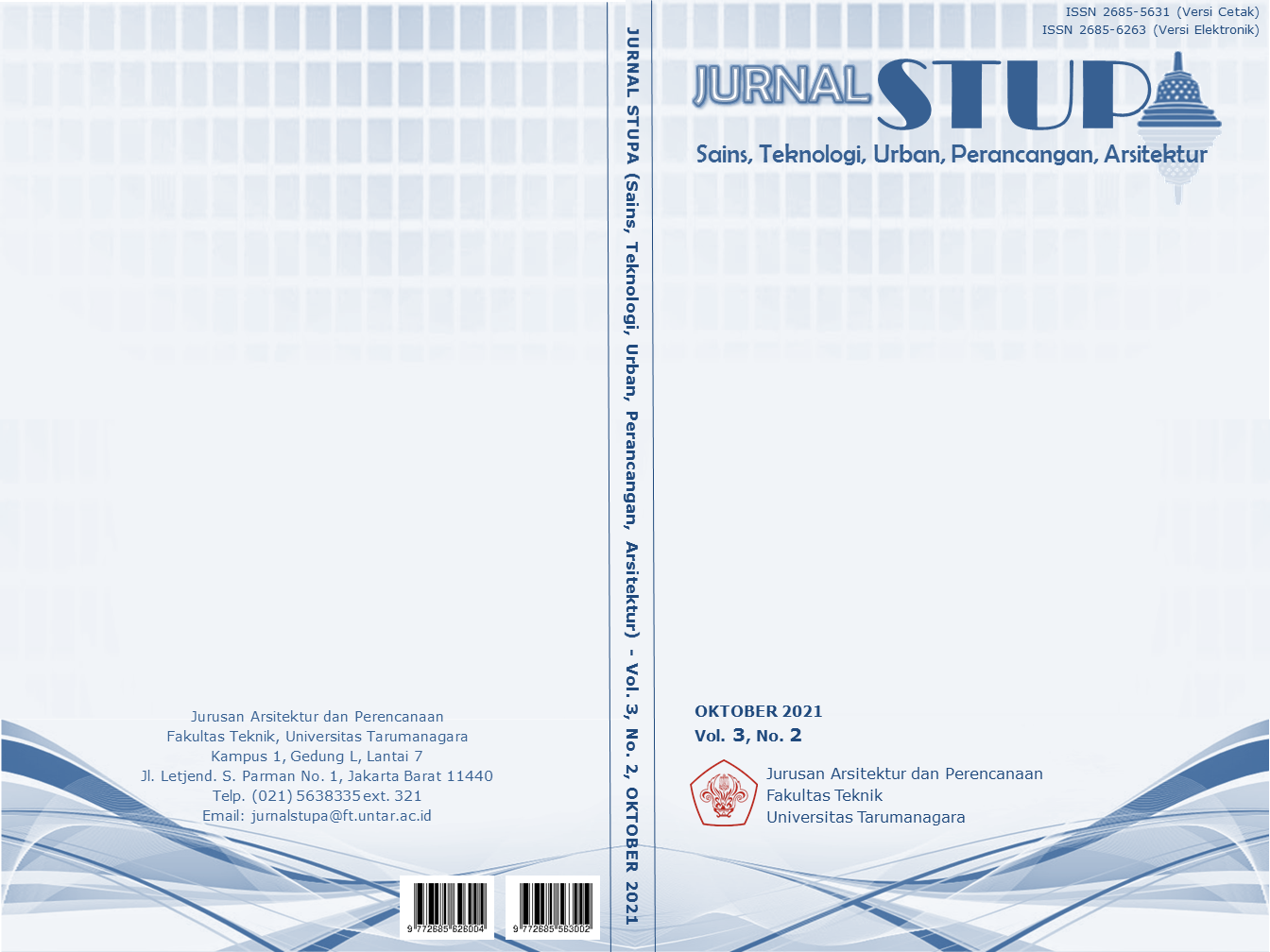KOMUNITAS SWASEMBADA BEBAS POLUSI KARBON DI RUSUN TANGERANG SELATAN
Main Article Content
Abstract
Earth's ecologies are getting worse every year, our earth's temperature has reached 1.2 degrees Celsius hotter than the pre-industrial times, the rapid development of humans seems to have "sacrificed" the ecological balance of earth. Global warming is one of the biggest problems that all inhabitants of the earth must help solve, we can feel its impact on especially the following 3 factors, namely food security (scarcity of food, etc.), water security (scarcity of clean water, etc.) and our health (change of climate, temperature, etc.). Small things such as our daily activities also play a big role global warming, where in fact the building and residential sector contributes up to 6% of this total problem, starting from the use of electrical energy, gas, to the waste that we produce from our homes every day. The problem is that along with times, of course, the number of people will continue to grow, residential needs in the future will be higher than ever before. Through this project, the author tries to change the residential concept that currently exists, integrating environmentally sustainable technology in residents, especially for the Jakarta area as the capital city of Indonesia, which is growing very fast (about 1% per year) and has now reached 10 million people (15 million is estimated by 2030). The existing eco-friendly technology will be applied into an architectural integration that also creates a self-sustaining life for its residents (generating their own needs), which is not only environmentally friendly but also reduces the daily living costs of the residents. In hope that it can be a pioneer of future residential trends in the future.
Keywords: global warming; Jakarta; residential; sustainable.
Abstrak
Ekologi bumi kian tahun kian memburuk, Suhu bumi telah meningkat 1,2 derajat celcius dari masa pra-industri. Perkembangan pesat manusia seakan-akan “mengorbankan” keseimbangan ekologi bumi ini. Pemanasan Global adalah salah satu masalah terbesar yang seluruh penghuni bumi harus turut bantu selesaikan bersama, tanpa solusi yang jitu dampaknya akan terasa pada 3 faktor berikut, yaitu food security (kelangkaan makanan, dll), water security (kelangkaan air bersih, dll) dan kesehatan kita (perubahan iklim, suhu, dll). Kegiatan terkecil kita sehari-hari pun berperan dalam permasalahan global warming ini. Faktanya sektor bangunan dan residensial berkontribusi hingga 6% dari keseluruhan permasalahan ini, mulai dari penggunaan energi listrik, gas, hingga limbah yang kita hasilkan dari rumah setiap harinya berdampak besar bagi dunia. Masalahnya, kebutuhan residensial kedepannya akan lebih tinggi daripada sebelumnya seiring dengan pertumbuhan jumlah penduduk dunia. Melalui proyek ini, penulis mencoba mengubah konsep residensial yang saat ini ada, mengintegrasikan teknologi ramah lingkungan pada residensial, khususnya bagi lingkungan provinsi Jakarta sebagai ibukota negara Indonesia yang pertumbuhannya sangat cepat (sekitar 1% per tahun) saat ini sudah mencapai angka 10 juta penduduk (15 juta diperkirakan pada tahun 2030). Teknologi ramah lingkungan yang sudah ada diterapkan kedalam sebuah integrasi arsitektural yang juga menciptakan self-sustaining life bagi penghuninya (menghasilkan kebutuhan sendiri), dimana tidak hanya ramah lingkungan tetapi juga mengurangi biaya hidup sehari-hari penghuninya. Diharapkan agar bisa menjadi pelopor tren residensial masa depan kedepannya.
Article Details
References
A Complete Guide To Solar Panel Output (2021). https://www.linquip.com/blog/a-complete-guide-to-solar-panel-output/
Buckhori, D. (2017). Definisi Ekologi. http://damayanti.staff.ipb.ac.id/files/2012/09/Pen dahuluan.pdf
Carbon Brief .“Profil Carbon Brief: Indonesia | Carbon Brief.” (2019), https://www.carbonbrief.org/profil-carbon-brief-indonesia.
Change, Intergovernmental Panel on Climate (2018). Global Warming of 1.5°C.
Cook, B. I., et al (2018). “Climate Change and Drought: From Past to Future.”
Fraga, R. & Burg, O.T. (2006). Urban Sustainable. Catalonia.
IPCC (2019). Technical Summary.
Kwok, R., and D. A. Rothrock (2009). “Decline in Arctic Sea Ice Thickness from Submarine and ICESat Records: 1958-2008.”
Maxwell-Gaines, C. “Rainwater Harvesting 101 | Your How-To Collect Rainwater Guide.” https://www.watercache.com/education/rainwater-harvesting-101.
Myers, S. S., et al (2017). “Climate Change and Global Food Systems: Potential Impacts on Food Security and Undernutrition.”
Nugroho, E., dan Sutrisno (2008).Budidaya Ikan dan Sayuran dengan Sistem Akuaponik. Penebar Swadaya : Jakarta.
PEMBUATAN BIOGAS DARI LIMBAH ORGANIK DAN PEMANFAATANNYA (2010). http://www.lontar.ui.ac.id/file?file=digital/131551-T+27594-Analisis+potensi-Tinjauan+literatur.pdf
The Spiritual Life .“Effects Of Global Warming.” (2019), https://slife.org/effects-of-global-warming/.
WMO UNEP (2020), https://www.ipcc.ch/site/assets/uploads/sites/4/2020/02/SPM_Updated-Jan20.pdf.
Wuttig, M, Raoux, & Simone (2010). Phase Change Materials. Springer Science & Business Media.
World Green Building Council .“What Is Green Building? | World Green Building Council.”, https://www.worldgbc.org/what-green-building.



